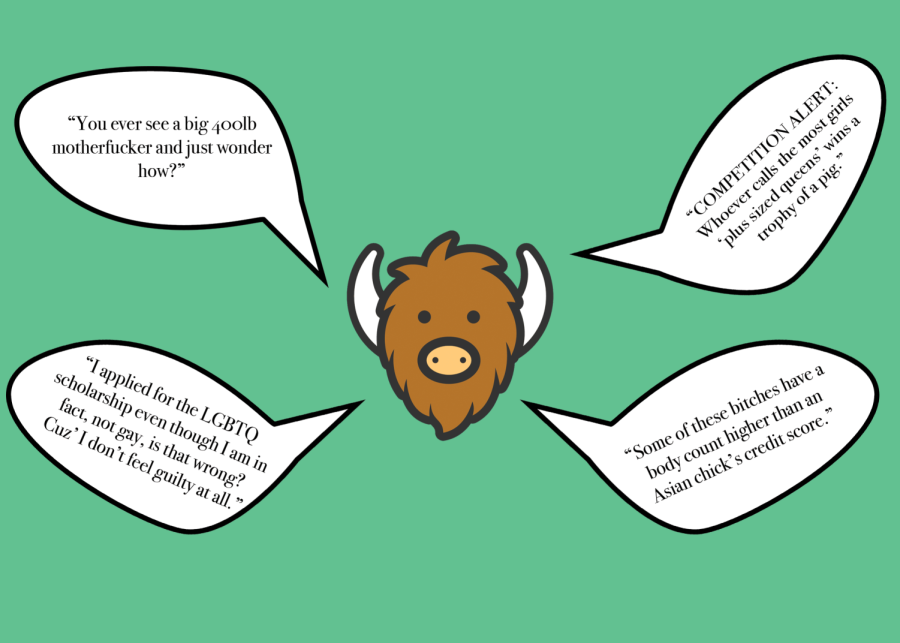The Yak strikes again
December 7, 2022
“Some of these chicks have a body count higher than an Asian chick’s credit score.”
“You ever see a big 400lb motherfucker and wonder how?”
“Genders are like the Twin Towers, there used to be two and now it’s a sensitive subject.”
These are comments from people on the UW Oshkosh campus who use Yik Yak, an anonymous social media app that employs proximity-based posting — the posts that you see are made by people within a 5-mile radius of your current location. Though the app was shut down in April 2017, it was revived in August 2021.
Yik Yak has infamously faced legal challenges, been utilized by campus police forces to identify illegal behaviors and braved torrents of criticism saying that the app enables cyberbullying. Though Yik Yak has a policy against using real names, viewing the app on the UWO campus revealed multiple students identified by name in offensive posts. While these instances were select, bigoted comments still were common, even after just briefly scrolling.
Reported posts on Yik Yak are subject to review by moderators; they will also be automatically removed if they reach a -5 voting score, according to Yik Yak’s community guidelines. But while the app has support resources, including those for mental health, posted throughout its website, critics are quick to note the bullying that does occur on the app.
One UWO Yik Yak post recently received attention from the Jewish On Campus Instagram account, which commonly showcases instances of antisemitic campus behavior. The post, seemingly making reference to Holocaust denialism, said, “If I take 1 hour to bake a batch of cookies and the Cookie Monster has 15 ovens working 24 hour a day for 5 years, how long does it take the Cookie Monster to make 6,000,000 batches of cookie.” Jewish On Campus’s post, which urged viewers to tag UWO’s Instagram, had received over 1,200 likes at the time of this article’s publication.
Jewish On Campus, a nonprofit, student-run organization describing itself as “the movement of the Jewish future,” later said in an online press release that Yik Yak and similar apps make it so “average students can access vile rhetoric,” and said that many students on such apps are exposed to bigotry even though they simply downloaded the app to “scroll through funny comments or innocuous messages about their school.”
Maggie Minnick, a fourth-year geography major at UW-Eau Claire, said that Yik Yak can be fun, but recognized that a lot of people on the app “use it to be bigoted or annoyed publicly.” She said that the app can vary in character from location to location, saying that in Eau Claire, Yik Yak seems to “to be the place people love to complain on, ask for advice about sticky situations, profess deep loneliness and hide other dark feelings.”
“I think Yik Yak shows the best and worst of people because of the anonymity provided, and that’s why I rarely use the app,” Minnick said. “I only use it to get a pulse on what the freshmen are up to, and if people are shit talking the newest pop album or campus decision.” Minnick said that the app can be a “fun place” if one doesn’t take it too seriously.
Chris Parish, a second-year English education major at UWO, said that he used the app his first year, but has since deleted it. Parish said that some people at UWO use Yik Yak for posting funny comments or “mostly harmless ideas.” Yet he also said that he’s seen “Yik Yak used to purposely embarrass and hate on certain people and groups in the UWO community.”
“I’ve absolutely seen bullying and bigotry on Yik Yak,” Parish said. “I’ve seen negative comments about every race, as well as the spreading of radical and hateful ideas. Specific students on campus have also been targeted.”
The anonymity of the app allows anyone using it to post “anything at any time without any sort of repercussions,” Parish said. Though he enjoyed using it at the time, Parish also said, “Yik Yak can be a hateful and negative space” for its users.
Parish offered a “strike system” banning an abusive user’s account or device as a potential solution to target toxicity and bullying on the app.
“Hopefully Yik Yak eventually makes changes that could allow the platform to become more of a positive space again,” he said.














